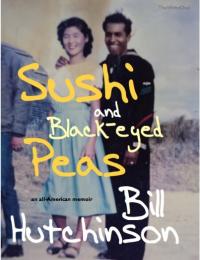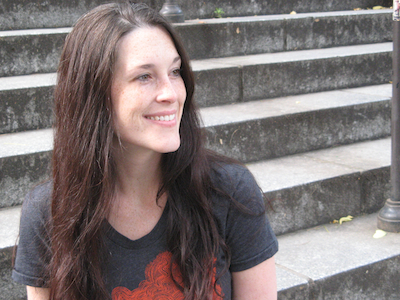An introduction to journalist Bill Hutchinson, the author of the memoir Sushi and Black-Eyed Peas (TheWriteDeal e-leaf, 2012). A senior writer for the New York Daily News, Hutchinson has also worked as a reporter for the Boston Herald, the Fresno Bee, the Contra Costa Sun and the Daily Ledger-Post Dispatch in the California Delta. Hutchinson grew up in Central California, the youngest son of an Okinawan mother and a Black, Irish Cherokee father. He began to write his memoir because “too many kinfolk were dying and taking great stories to their graves.”
Quick Facts on Bill Hutchinson
- Hutchinson online: Sushi and Black-Eyed Peas, Twitter @bill_hutchinson
- Home: Brooklyn, New York
- Comfort food: Sushi and black-eyed peas, burritos, and my own thin-crust pizza
- Top reads: A Drinking Life by Pete Hamill, The Book of Illusions by Paul Auster, The Color of Water by James McBride, On the Road by Jack Kerouac, Five-Finger Discount by Helene Stapinski
- Current reads: Great House by Nicole Krauss
What are you working on at the moment?
I’ve just written six stories in one night shift for the New York Daily News; the subjects ranged from Kim Kardashian’s divorce mess, to skinny-dipping Congressmen, to moviemaker Tony Scott’s death plunge. I’m also writing the final 150 pages of Sushi and Black-Eyed Peas. So, I’m virtually writing 15 hours a day.
What made you decide to write Sushi and Black-Eyed Peas?
“Too many kinfolk were dying
and taking great stories to their graves.”
Death. Too many kinfolk were dying and taking great stories to their graves. Luckily, I got many of them on tape. Now they call out to me like pesky ghosts, saying, “When ya gonna finish that book, boy!” I feel a heavy obligation to them.
What do you hope readers will take away from this book?
A sense that a multiracial United States is not a new phenomenon, that some of our roots have been tangled since the 1920s. And, I hope readers draw inspiration from one Japanese-Cherokee-Irish-African-American’s drive to make it out of the American melting pot.
Whom do you picture as the ideal reader of your work?
Anyone who grew up in a small town feeling like a misfit, anyone from a disadvantaged background who remains optimistic about the chances for success.
Where and when do you prefer to write?
I write in the mornings, between 9am and noon. I write on a 7-year-old Dell Ispiron 1200, seated in my living room at a round, battered wooden table, next to a window with a view of the leafy backyards of Brownstone Brooklyn.
Where would you most want to live and write?
I’m exactly where I need to be at the moment. It gives me a good perspective on writing about where I came from.
Do you listen to anything while you write?
Just the bugs, birds, and traffic filtering through the open window.
Do you have a philosophy for how and why you write?
Write a thought as fast as you can before you forget it, and then rewrite it 20 to 30 times.
How has your background as a journalist influenced your writing for this book?
“I had to learn how to stretch stories out, layer them.”
It’s been a benefit and a hindrance. While my skills as a reporter gave me a leg up on tracking down records, researching archives, and asking tough questions, I found that newspaper-style writing hampered me. I had to learn how to stretch stories out, layer them, and show the specific-revealing details of my life. In the newspaper, I string bare facts together, making sure they fit coherently and hum with an urgent tone, leaving most of the minutiae that makes a good memoir on the editing floor.
What do you find most challenging about writing memoir?
Striving for accuracy and honesty, while doing so in an entertaining and colloquial style.
Since you’re writing about your family, how have relatives reacted to your work?
One niece says she stopped reading it because some of the startling revelations overwhelmed her. I understand that. Some things I witnessed growing up were astonishingly disturbing, breaching the borders of sanity. My goal was to describe facts as they unfolded, raw and unvarnished. The majority of my family has welcomed it. My mother, Sumiko, offered the best review: “It’s the truth.” Many of my relatives came to a reading I did of Sushi and Black-Eyed Peas at my hometown library and encouraged me to carry on. My uncle, the Reverend C.L. Hutchinson, pastor of the House of Love Deliverance Church, who I write about, said I got his unique preaching style down pat.
How have your goals as a writer changed over time?
I want to write something that has lasting value, instead of writing something I’ve seen on subway floors a day later.
Is there a quote about writing that motivates or inspires you?
I was watching The Charlie Rose Show one night and heard Gore Vidal say, “Don’t try to be a great writer; just try to be a good writer.”
What advice would you give to aspiring writers?
Be extremely patient; try to be positive about rejection. Know that writing isn’t magic, it is hard work and an on-going battle with self-doubt.
“It is hard work and an on-going battle with self-doubt.”
What’s the best advice you’ve been given as a writer?
“Journalism is not your forté,” from a college professor who strongly suggested I consider another major. His doom and gloom only inspired me.
Is there a question you find surprising that people ask you about your work?
When your ethnicity is as hyphenated as mine, your town is as redneck as mine, and your loved ones speak in tongues and go around casting Satan out of each other, no question is surprising.
When you’re not writing, what do you like to do?
I’m also a self-taught abstract artist constantly painting and drawing, a voracious reader, and an amateur surfer.
About Bill Hutchinson
Bill Hutchinson is a senior writer for the New York Daily News. He has also worked as a reporter for the Boston Herald, the Fresno Bee, the Contra Costa Sun and the Daily Ledger-Post Dispatch in the California Delta. He has reported on the biggest news stories of his generation, from the Columbine High School massacre to the death of Osama Bin Laden. He is a graduate of San Francisco State University, and played a key role in the Daily News’ award-winning coverage of the September 11th attacks. He has appeared on national television and radio networks, including MSNBC, CNN, ABC and FOX News. His memoir Sushi and Black-Eyed Peas is available as an e-leaf from TheWriteDeal.
[Toffoli, Marissa B. “Interview With Writer Bill Hutchinson.” Words With Writers (September 14, 2012), https://wordswithwriters.com/2012/09/14/bill-hutchinson/.]

Sushi and Black-Eyed Peas by Bill Hutchinson (TheWriteDeal e-leaf).




Great, crisp interview with lots of insightful comments. The one I’m going to remember is Gore Vidal saying Don’t try to be a great writer, Try to be a good writer. Essential!
I can also relate to the very mixed family genes and the struggle to negotiate the melting pot.